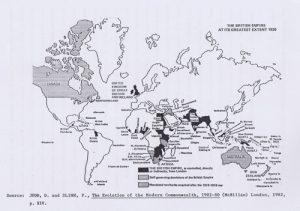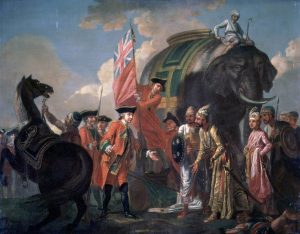American Anti-Colonialism, and the Liquidation of the British Empire.
The Trusteeship was the embryo of the “Four Policemen” scheme by which the United States, Britain, Russia and China would patrol the world to keep the peace. Trusteeship to Roosevelt meant far more than the guardianship of colonial peoples. It contained the whole organisation of the post-war world. “Having stressed this important application of the concept in a way that he did not divulge publicly, it is no less important to emphasise that Roosevelt espoused the idea in a traditional sense shared by many Americans. He believed that subject peoples should be held in tutelage only until they could stand on their own feet.”53
Roosevelt’s conviction was strengthened by the courage and loyalty of the Philippines during the Japanese conquest. In his message to the people of the Philippine Islands on the 28th December 1941 he stated:
“The people of the United States will never forget what the people of the Philippine Islands are doing this day and will so in the days to come. I give to the people of the Philippines my solemn pledge that their freedom will be redeemed and their independence established and protected. The entire resources, in men and in material, of the United States stand behind that pledge.”54
In Roosevelt’s view the colonial powers would do well to follow the United States’ example in the Philippines. Roosevelt also believed that the lessons of the history of the United States’ independence could be applied to India. When the government of the United Kingdom, in March the next year, announced the Cripps mission Roosevelt explained to the British Prime Minister that, “following the American revolution a stopgap government had been formed under the Articles of Confederation. He believed a similar transitional government might be possible in Inia. It could be composed of the different religions, castes and occupations representing various regions.”55
As a result, through the trusteeship system at the United Nations, the United States induced the colonial powers to set a date for granting independence to the colonies. Thus, it could be concluded that “the demand for a time-table was a distinctly American contribution to the process of the decolonisation of the British Empire.”56
Notes:
1. W.R. JOHNSTON, Great Britain, Great Empire, (Queensland: Queensland U.P., 1981), p. 3.
2. ibid., p. 3.
3. T.O. LLOYD, The British Empire 1558-1983, (New York: Oxford U. P., 1984), p. xi.
4. D.DILKS, Retreat from Power (Volume II: After 1939), (London: McMillan, 1981), p. 1.
5. ROYAL INSTITUTE OF INTERNATIONAL AFFARIS, Political and Strategic Interests of the United Kingdom, (London: Oxford U. P., 1939), p.271
6. ibid.
7. ibid., p. 275.
8. ibid.
9. ibid., p. 276
10. ibid.
11. ROYAL INSTITUTE OF INTERNATIOONAL AFFAIRS, British Security, (London: Oxford U. P., 1946), p. 47.
12. ibid.
13. W. R. JOHNSTON, Great Britain, Great Empire, (Queensland: Queensland U. P., 1981), p. 59.
14. ibid., p. 63.
15. ibid., p. 57.
16. ibid., p. 60.
17. ibid., p. 98.
18. ibid.
19. P. KENNEDY, The Realities Behind Diplomacy, (London: Fontana, 1981), p. 23.
20. ibid., p. 24.
21. ibid.
22. ibid., p. 25.
23. ibid., p. 23.
24. ibid.
25. ibid., p. 26.
26. ibid., p. 32.
27. ibid., p. 35.
28. P. KENNEDY, Strategy and Diplomacy 1870-1954, (London: Fontana, 1984), p. 18.
29. A. L. BURT, The Evolution of the British Empire and Commonwealth from the American Revolution, (Boston: D. C. Heath, 1956), p. 679
30. ibid.
31. ROYAL INSITUTE OF INTERNATIONAL AFFAIRS, Political and Strategic Interests of the United Kingdom, (London: Oxford U. P., 1939), p. 4.
32. D. JUDD and P. SLINN, The Evolution of the Modern Commonwealth 1902-80, (London: McMillan, 1982), p. 37.
33. ibid.
34. ibid., p. 38.
35. ibid.
36. ibid.
37. ibid., p. 39.
38. ibid., p. 40.
39. A. L. BURT op. cit., p. 809.
40. D. MCINTYRE, The Commonwealth of Nations. Origins and Impact, 1869-1971, (Minneapolis: University of Minnesota, Oxford U. P., 1977), pp. 336-7.
41. ibid., p. 337.
42. D. JUD and P. SLINN, op. cit., pp. 84-5.
43. ibid., p. 86.
44. G. CHALIAND and J-P. RAGEAU Strategic Atlas: World Geopolitics, (New York: Penguin, 1986), p. 78.
45. ibid.
46. J. MORRIS, Farewell the Trumpets, (London: Faber and Faber, 1978), p. 464.
47. ibid.
48. W. R. LOUIS, Imperialism at Bay: The United States and the Decolonization of the British Empire, 1941-1945, (New York: Oxford U. P., 1986), p. 227.
49. ibid., p. 226.
50. ibid.
51. ibid., p. 148.
52. ibid., p. 115.
53. ibid., p. 116.
54. ibid., p. 148.
55. ibid.
56. ibid., p. 149.



